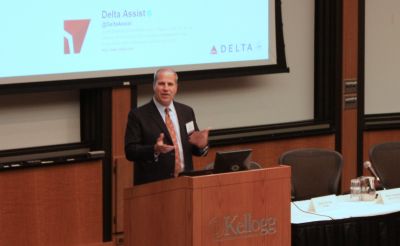CCITT Newsletter Spring 2011
Fall 2011 - Volume 5, Issue 1
Reliable Routing in Transit Networks
Integration of Real-Time Mapping Technology in Disaster Relief Distribution
Faculty Spotlight: Irina Dolinskaya
New Research Assistants
Dissertation Year Fellows
Customer Experience Workshop
Tech Transfer Updates
Reliable Routing in Transit Networks
 Principal Investigator: Marco Nie, Assistant Professor, Civil and Environmental Engineering
Principal Investigator: Marco Nie, Assistant Professor, Civil and Environmental Engineering
Student Researcher: Qianfei Li, PhD Candidate, Transportation System Analysis and Planning
Goal: Help travelers hedge against uncertainties in transit networks.
Solution: The investigators will develop software algorithms to measure and analyze the reliability performance of transit services and implement a prototype reliability-based transit route planning tool. The tool will be tested on bus routes identified and managed by the Chicago Transit Authority (CTA).
Background: Travel reliability is a critical dimension in the user experience of public transportation services. Next only to travel time, commuters in the Chicago metropolitan area identified reliability as the second most important factor that affects their mode and route choice through a survey conducted by Northwestern and the CTA in a previous CCITT study (Nie, Wu, Zissman, Lee & Haynes 2010). Almost half of the commuters surveyed described their transit service as “unreliable.” Furthermore, transit systems are affected by uncertainties of various sorts, ranging from extreme weather conditions and serious traffic accidents to unforeseeable mechanical failures and human errors. While these uncertainties could adversely disrupt transit services, the overall impacts are rarely documented and understood in existing systems. As a result, neither transit operators nor transit users are able to make proactive decisions to ensure travel reliability. Ignoring the impacts of uncertainties often results in misallocation of limited resources in the transit system. From the user point of view, the lack of reliability either encourages overly conservative risk-averse behavior or leads to uncomfortable, sometimes disastrous, disruptions.
Integration of Real-Time Mapping Technology in Disaster Relief Distribution
Principal Investigator: Irina Dolinskaya, Assistant Professor, Industrial Engineering and Management Sciences
Co-PIs: Karen Smilowitz, Professor, Industrial Engineering and Management Sciences
Jennifer Chan, Assistant Professor, Emergency Medicine
Student Researcher: Teresa Chen, Undergraduate Student, Industrial Engineering and Management Sciences
Goal: Improve the distribution of relief supplies in humanitarian settings by developing a set of test bed scenarios for the testing of relief routing strategies.
Solution: Though matching support from the Google Research Awards program, the investigators will develop dynamic routing models tailored to humanitarian logistics situations and evaluate the performance of these techniques in the field in partnership with relief organizations. Using the information gathered in the field situations, the research team will generate a set of test cases for the research community at large to evaluate iterative or alternative routing designs and solutions. To facilitate wide implementation and potential commercialization of the work, the test cases will be available online to practitioners and academicians, through a server dedicated to Humanitarian and Non-Profit Logistics at Northwestern University.
Background: The proposed research focuses on dynamic routing models for the distribution of relief supplies in humanitarian settings. The investigators will concentrate on improving existing models by incorporating new mapping technologies and real-time information to mitigate the effects of dynamic changes during humanitarian crises and disasters.
Vehicle routing in humanitarian logistics, such as disaster relief distribution, involves many challenges that distinguish these problems from those in commercial settings, given the time sensitive and resource constrained nature of relief activities. While operations research approaches can improve the effectiveness of relief routing, these challenges must be addressed in routing models in order to realize their potential. Steady advances in relief routing techniques in the academic community are spurring aid organizations to collaborate with academic researchers, such as Northwestern, to increase the effectives of relief-oriented routing models and strategies. In addition, the investigators seek to leverage increasing availability and access to information technology in the wake of disasters to further effectiveness of routing models for aid distribution. However, the investigators and their aid organization collaborators face many challenges integrating new streams of imagery, mapping, and crowd-sourced real-time data with their solutions. Therefore, the investigators are pleased to have access to Google research funding and expertise during this project.Faculty Spotlight: Irina Dolinskaya
 Irina Dolinskaya is Principal Investigator for the CCITT-funded project “Integration of Real-Time Mapping Technology in Disaster Relief Distribution.” Dolinskaya is an assistant professor of Industrial Engineering and Management Sciences and a member of the Humanitarian Logistics Initiative at Northwestern University. She obtained MS and PhD degrees in Industrial and Operations Engineering from the University of Michigan, and a bachelor’s degree in Industrial Engineering from the University of Florida.
Irina Dolinskaya is Principal Investigator for the CCITT-funded project “Integration of Real-Time Mapping Technology in Disaster Relief Distribution.” Dolinskaya is an assistant professor of Industrial Engineering and Management Sciences and a member of the Humanitarian Logistics Initiative at Northwestern University. She obtained MS and PhD degrees in Industrial and Operations Engineering from the University of Michigan, and a bachelor’s degree in Industrial Engineering from the University of Florida.
Her research interests include operations research with emphasis on large scale and computationally demanding dynamic programming problems, optimal path finding in evolving systems, and effective planning under limited information. Applications include problems in humanitarian logistics, optimum vessel performance in evolving nonlinear wavefields, electric vehicle routing, and autonomous navigation for amphibious vehicles.
Dr. Dolinskaya was the winner of the 2010 INFORMS Transportation Science & Logistics Society Dissertation Prize and the 2008 recipient of the Bonder Scholarship for Applied Operations Research in Military Applications.
New Research Assistants
 Teresa Chen is currently an undergraduate student majoring in industrial engineering and management sciences as well as economics at Northwestern University. She joined the Northwestern Humanitarian Logistics team this past summer (2011) and is currently working on disaster relief and supply distribution research project with PhD candidate Luis de la Torre as well as Professor Irina Dolinskaya and Professor Karen Smilowitz. As a junior, Teresa is interested in applying what she has learned through industrial engineering courses to help improve humanitarian relief efforts.
Teresa Chen is currently an undergraduate student majoring in industrial engineering and management sciences as well as economics at Northwestern University. She joined the Northwestern Humanitarian Logistics team this past summer (2011) and is currently working on disaster relief and supply distribution research project with PhD candidate Luis de la Torre as well as Professor Irina Dolinskaya and Professor Karen Smilowitz. As a junior, Teresa is interested in applying what she has learned through industrial engineering courses to help improve humanitarian relief efforts.
 Qianfei Li is currently a PhD candidate in transportation system analysis and planning at Northwestern University. Before joining Northwestern University, he received his bachelor’s degree in transportation engineering in 2008 from Beijing Institute of Technology and his master’s of science degree in industrial and operations engineering from University of Michigan-Ann Arbor in 2010. He is working with Professor. Yu (Marco) Nie, and is a member of Dr. Nie’s NU-TREND (Northwestern University - Transportation, Reliability, Equilibrium, Network, Dynamics) group. His research interests include network modeling and design, logistics system, public transit scheduling, and large-scale optimization.
Qianfei Li is currently a PhD candidate in transportation system analysis and planning at Northwestern University. Before joining Northwestern University, he received his bachelor’s degree in transportation engineering in 2008 from Beijing Institute of Technology and his master’s of science degree in industrial and operations engineering from University of Michigan-Ann Arbor in 2010. He is working with Professor. Yu (Marco) Nie, and is a member of Dr. Nie’s NU-TREND (Northwestern University - Transportation, Reliability, Equilibrium, Network, Dynamics) group. His research interests include network modeling and design, logistics system, public transit scheduling, and large-scale optimization.
Dissertation Year Fellows
During the 2011-2012 academic year, CCITT and the Northwestern University Transportation Center (NUTC) are supporting two dissertation year fellows in Civil and Environmental Engineering.
Laurence Audenaerd
Advisor: Dr. Joseph Schofer
Topic: Bringing Short-Haul Air Down to Earth: Exploring the Trade-Space of Mode Substitution for Regional Air Passenger Transport Markets
Yang Liu
Advisor: Dr. Yu "Marco" Nie
Topic: Welfare Effects of Congestion Pricing on Travelers with Different Value of Time: Strategies to Enable Transportation
Customer Experience Workshop
The user experience is at the core of transportation research at Northwestern University. To explore this concept further, CCITT co-chaired a workshop, “Improving the Customer Experience in Travel and Transportation Using Information Technology (IT),” with Teradata Corporation and the NUTC.
The workshop explored examples of good customer care and tools for improving the experience for both travelers and users of freight and logistics services in two panel discussions. The evidence suggested that current practices are only “fixing” disruptions in the current service delivery model. That is, when an experience fails to meet a predetermined expectation, agents intercede to alleviate the damage. In his opening remarks, event co-chair Peeter Kivestu of Teradata stated, “(although) meaningful progress in the customer experience increasingly depends on information technology, finding the sweet spot for leveraging information technology is not something that is easy to discover.” Future research and applications should use tools and knowledge of customer behavior to anticipate disruptions and avoid them altogether.
 While much potential exists for IT to improve the user experience, the traveler panel discussants (Dick Alexander, Veolia Transportation; Perry Cantarutti, Delta Airlines; and Kivestu) suggested customers still expect “warm, friendly service”. Yet, they agreed technology will be a strong tool in aligning the customer and employee expectations so each can navigate smoothly through service disruptions. For example, Cantarruti noted that social media is particularly useful in this regard in allowing agents to serve multiple customers at a time. Customers tweeting their concerns and rebooking requests do not have to endure twenty minutes of elevator music interrupted by the periodic “all agents are busy, your call is important to us, please stay on the line” recordings.
While much potential exists for IT to improve the user experience, the traveler panel discussants (Dick Alexander, Veolia Transportation; Perry Cantarutti, Delta Airlines; and Kivestu) suggested customers still expect “warm, friendly service”. Yet, they agreed technology will be a strong tool in aligning the customer and employee expectations so each can navigate smoothly through service disruptions. For example, Cantarruti noted that social media is particularly useful in this regard in allowing agents to serve multiple customers at a time. Customers tweeting their concerns and rebooking requests do not have to endure twenty minutes of elevator music interrupted by the periodic “all agents are busy, your call is important to us, please stay on the line” recordings.
Two common questions surrounding enhanced customer traveler experience are: how much data is needed to make a difference, and how safe is that data? In order to answer these questions, researchers and providers need a clearer understanding of people’s willingness to share private information and the level of customer participation required to minimize uncertainty.
In the freight panel, the presenters (David Adams, GTNexus; Dr. Mark Cooper, FedEx Services; and Gary Smith, Con-way Freight) shared insight regarding how businesses have been successfully benefiting from new information models, continually improving service quality indices, and using customer information for business decisions.
Freight companies, like their passenger carrier counterparts, are inspired by the latest developments in the internet environment. Examples provided by Adams included cloud storing of data, one-to-many and many-to-one ways of communicating as in social media platforms, and crowd sourcing in order to improve data quality by providing unmatched collaboration and correction opportunities.
Going from inter-enterprise to intra-enterprise, Cooper discussed the importance of measurable service quality indices in consummating the performance. These indices must reveal and address the true expectations of the customers, be continually reviewed to adapt to changes in technology and demand, partner with the operational team of the company to reach aggressive but attainable goals, and focus on the entire enterprise rather than a specific department.
Smith provided a solid example of the synergy between customer focus, innovative thinking and social media. Con-way leveraged customer feedback and IT to make a significant capital investment decision in a sour economy to address a critical user dissatisfaction - damaged freight.
In closing the workshop, NUTC Director Hani Mahmassani charged all participants to look beyond only meeting expectations to the delivery of new and pleasurable experiences for passengers and users of transportation services.
--Charlotte Frei and Ömer Verbas contributed to this article.Tech Transfer Update
- Professor Klabjan is working with NS and BNSF railroads to implement customized applications of the gang scheduling optimization tools and other railway specific problems developed via CCITT.
- EVIDENT, a web-based information system for site selection of electric vehicle charging stations as the result of CCITT research funding, has been used to facilitate site selections for 350Green. 350Green is a system integrator supporting the charging station infrastructure throughout the US. For example, the company is partnering with Walgreens to install charging stations at their locations. The system helps the company identify Walgreens locations that have strong potential for high usage of electric vehicles and plug-in hybrids.
- Carbon Day Automotive is a distributor of charging stations offered by Coulomb Technologies and is also using EVIDENT. The company is developing an advanced charging station technology that is being deployed in select areas around the US. Through EVIDENT, Carbon Day has access to an analytics-based information system that recommends stations with the highest predicted utilization. The research collaboration initiated by CCITT with Carbon Day Automotive is resulting in a long-term partnership.

